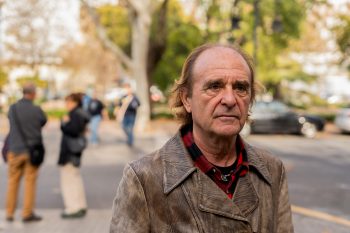It took 11 days in jail for Bruce* to be able to leave alcohol behind.

Bruce* is finding a fresh start, after years of homelessness and addiction.
That, and House of Friendship’s Live-In Treatment program.
“House of Friendship saved my life,” said Bruce. “I don’t know where I’d be without it.”
Ever since Bruce’s first visit to a bar when he was 19, alcohol has been a major part of his life.
“I had six double ryes and Cokes, and walked out of there, with no problem,” said Bruce. “I had a tolerance for it.”
When Bruce went to college, he was in a group that “partied hard” and still got good grades. With a good paying summer job, Bruce always had the money he needed to buy alcohol and go out to bars.
“Back then, I crashed on the floor, or couch, or wherever,” said Bruce. “During the week, we’d go for ‘liquid lunches.’ If I couldn’t get a ride to the bar, I would run to it at lunchtime.”
Bruce, now 62, spent years chasing the feelings that only alcohol could give him. In all the major milestones of his life – and the many days in between, alcohol was there. And it would lead him to some tough places – years of bouncing from shelter to shelter to living on the street. And sometimes, it even led to jail.
“I never had a good time with alcohol,” said Bruce. “It always led to destruction. It always led to trouble.”
Last year, Bruce assaulted his brother after an argument. It was bad enough to send Bruce to jail. It was then that he decided he needed help.
It took decades before Bruce felt ready to address his problem with alcohol, but the roots of his addiction go back as far as his childhood.
Growing up, Bruce always struggled to fit in, to feel like he belonged.
“I remember being chased and being picked on in grade school,” said Bruce. “When you are a loner, it’s hard. Everyone else got invited to birthday parties, but I didn’t. Everyone else used to get Valentine’s, but at my desk, nothing.”
Growing up in an Eastern European family, Bruce remembers getting half shots of alcohol on special occasions when he was as young as 10.
“It was just tradition.” He didn’t realize that he drank differently from others until he was an adult.
When he started drinking, there was no stopping. Alcohol was the only constant in Bruce’s life – jobs would come and go, and where he lived would always change, because he couldn’t keep up with the demands of his everyday life.
And while Bruce went through periods of sobriety and tried different treatment programs, he always turned back to alcohol when life became difficult.
“I didn’t know how to stop. When I went to a bar, if I had $400 in my pocket, it would be gone by morning. I couldn’t care less.”
When Bruce was finally at the point in his life where he was ready to make a change, the support he received at House of Friendship’s Live-In Treatment program made all the difference. Bruce met regularly with a counsellor and participated in the group sessions. He enjoyed cooking meals for other participants and encouraged others on their journey.
He was so motivated that he spent all his spare time working on his progress, filling in his binder with insights, and learning more about himself as he went.
“When you are on the street, you don’t know how to act. It’s not how someone treats you, it’s how you react that matters. I had to learn that.”
Bruce continues to work on his goals, regularly meeting with a counsellor as part of the program’s after-care support. He is looking forward to the future with hope, for the first time in a long time.
He’s also incredibly thankful for the help he received through House of Friendship.
“It’s not a right to be at the House of Friendship; it’s a privilege,” said Bruce.
Thank you for being there for men like Bruce as they start a fresh chapter in their lives! Your care and compassion help reduce the stigma of addiction and are changing lives for the better!
*Name changed to preserve the privacy and dignity of the storyteller.